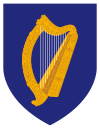- External Relations Act
-
Irlande Cet article fait partie de la série sur la
politique de l'Irlande,
sous-série sur la politique.
Wikimedia Foundation. 2010.
Contenu soumis à la licence CC-BY-SA. Source : Article External Relations Act de Wikipédia en français (auteurs)
Regardez d'autres dictionnaires:
Executive Authority (External Relations) Act 1936 — The Executive Authority (External Relations) Act, 1936 was an enactment of the Oireachtas (Irish parliament) in 1936. The Act was one of two passed suddenly to deal with the aftermath of the abdication of King Edward VIII as King of Ireland along … Wikipedia
Taiwan Relations Act — The Taiwan Relations Act is an act of the United States Congress passed in 1979 after the establishment of relations with the People s Republic of China (PRC) and the breaking of relations between the United States and the Republic of China (ROC) … Wikipedia
External relations of the Isle of Man — Under British law, the Isle of Man is a Crown dependency and not an integral part of the United Kingdom.However, the UK takes care of its external and defence affairs, and retains paramount power to legislate for the Island.CitizenshipThere is no … Wikipedia
Employment Relations Act 2000 — Infobox NZ Legislation short title=Employment Relations Act long title= No long title introduced by= date passed=2000 royal assent= commencement= October 2 2000 amendments= 2001, 2004 related legislation= Industrial Conciliation and Arbitration… … Wikipedia
National Labor Relations Act — President Franklin Delano Roosevelt signs the act on July 9, 1935. Secretary of Labor Frances Perkins (right) looks on. The National Labor Relations Act or Wagner Act (after its sponsor, New York Senator Robert F. Wagner) (Pub.L. 74 198,… … Wikipedia
European Commissioner for External Relations — This article is about a historic position in the European Commission, for the current foreign affairs position see High Representative History of the European Union This article is part of a series … Wikipedia
Workplace Relations Act 1996 — Infobox AU Legislation short title=Workplace Relations Act 1996 parliament=Parliament of Australia long title=An Act relating to workplace relations, and for other purposes introduced by= date passed= royal assent= commencement= 1 January 1997… … Wikipedia
Employment Relations Act 1999 — The Employee Relations Act 1999 is a British law. The law provides compensation for unfair dismissal and The act allows workers to receive at least 3 months unpaid leave for the purpose of caring for a child. Mothers can have up to 18 weeks paid… … Wikipedia
Reference re Public Service Employee Relations Act (Alta.) — [1987] 1 S.C.R. 313 is a leading opinion of the Supreme Court of Canada on right to freedom of association under section 2(d) of the Canadian Charter of Rights and Freedoms . The Court held that section 2(d) does not include the right to strike … Wikipedia
Act of Settlement 1701 — The Act of Settlement is an act of the Parliament of England, originally filed in 1700, and passed in 1701, to settle the succession to the English throne on the Electress Sophia of Hanoverndash a granddaughter of James Indash and her Protestant… … Wikipedia

